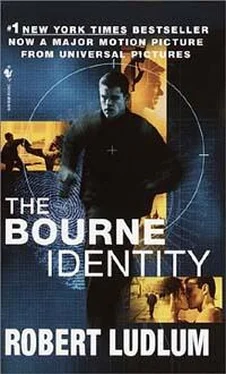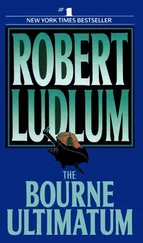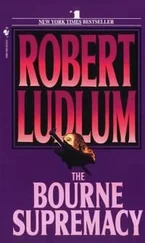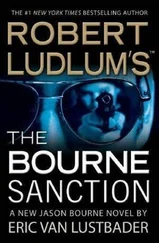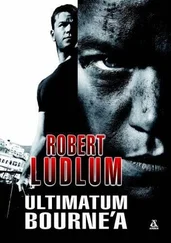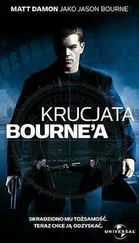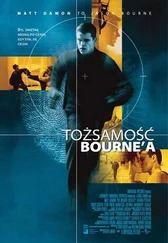“What was the price?”
“Operation Medusa sustained over ninety percent casualties. But there’s a catch—among those who didn’t come back were a number who never meant to.”
“From that faction of thieves and fugitives?”
“Yes. Some stole considerable amounts of money from Medusa. We think Cain is one of those men.”
“Why?”
“His modus operandi. He’s used codes, traps, methods of killing and transport that were developed and specialized in the Medusa training.”
“Then for Christ’s sake,” broke in Walters, “you’ve got a direct line to his identity. I don’t care where they’re buried—and I’m damn sure you don’t want them made public—but I assume records were kept.”
“They were, and we’ve extracted them all from the clandestine archives, inclusive of this material here.” The officer tapped the file in front of him. “We’ve studied everything, put rosters under microscopes, fed facts into computers—everything we could think of. We’re no further along than when we began.”
“That’s incredible,” said the congressman. “Or incredibly incompetent.”
“Not really,” protested Manning. “Look at the man; look at what we’ve had to work with. After the war, Cain made his reputation throughout most of East Asia, from as far north as Tokyo down through the Philippines, Malaysia and Singapore, with side trips to Hong Kong, Cambodia, Laos and Calcutta. About two and a half years ago reports began filtering in to our Asian stations and embassies. There was an assassin for hire; his name was Cain. Highly professional, ruthless. These reports started growing with alarming frequency. It seemed that with every killing of note, Cain was involved. Sources would phone embassies in the middle of the night, or stop attachés in the streets, always with the same information. It was Cain, Cain was the one. A murder in Tokyo; a car blown up in Hong Kong; a narcotics caravan ambushed in the Triangle; a banker shot in Calcutta; an ambassador assassinated in Moulmein; a Russian technician or an American businessman killed in the streets of Shanghai itself. Cain was everywhere, his name whispered by dozens of trusted informants in every vital intelligence sector. Yet no one—not one single person in the entire east Pacific area—would come forward to give us an identification. Where were we to begin?”
“But by this time hadn’t you established the fact that he’d been with Medusa?” asked the Tennessean.
“Yes. Firmly.”
“Then with the individual Medusa dossiers, damn it!”
The colonel opened the folder he had removed from the Cain file. “These are the casualty lists. Among the white Occidentals who disappeared from Operation Medusa—and when I say disappeared, I mean vanished without a trace—are the following. Seventy-three Americans, forty-six French, thirty-nine and twenty-four Australians and British respectively, and an estimated fifty white male contacts recruited from neutrals in Hanoi and trained in the field—most of them we never knew. Over two hundred and thirty possibilities; how many are blind alleys? Who’s alive? Who’s dead? Even if we learned the name of every man who actually survived, who is he now? What is he? We’re not even sure of Cain’s nationality. We think he’s American, but there’s no proof.”
“Cain’s one of the side issues contained in our constant pressure on Hanoi to trace MIAs,” explained Knowlton. “We keep recycling these names in with the division lists.”
“And there’s a catch with that, too,” added the army officer. “Hanoi’s counterintelligence forces broke and executed scores of Medusa personnel. They were aware of the operation, and we never ruled out the possibility of infiltration. Hanoi knew the Medusans weren’t combat troops; they wore no uniforms. Accountability was never required.”
Walters held out his hand. “May I?” he said, nodding at the stapled pages.
“Certainly.” The officer gave them to the congressman. “You understand of course that those names still remain classified, as does the Medusa Operation itself.”
“Who made that decision?”
“It’s an unbroken executive order from successive presidents based on the recommendation of the Joint Chiefs of Staff. It was supported by the Senate Armed Services Committee.”
“That’s considerable firepower, isn’t it?”
“It was felt to be in the national interest,” said the CIA Man.
“In this case, I won’t argue,” agreed Walters. “The specter of such an operation wouldn’t do much for the glory of Old Glory. We don’t train assassins, much less field them.” He flipped through the pages. “And somewhere here just happens to be an assassin we trained and fielded and now can’t find.”
“We believe that, yes,” said the colonel.
“You say he made his reputation in Asia, but moved to Europe. When?”
“About a year ago.”
“Why? Any ideas?”
“The obvious, I’d suggest,” said Peter Knowlton. “He overextended himself. Something went wrong and he felt threatened. He was a white killer among Orientals, at best a dangerous concept, it was time for him to move on. God knows his reputation was made; there’d be no lack of employment in Europe.”
David Abbott cleared his throat. “I’d like to offer another possibility based on something Alfred said a few minutes ago.” The Monk paused and nodded deferentially at Gillette. “He said that we had been forced to concentrate on a ‘toothless sand shark while the hammerhead roamed free,’ I believe that was the phrase, although my sequence may be wrong.”
“Yes,” said the man from NSC. “I was referring to Carlos, of course. It’s not Cain we should be after. It’s Carlos.”
“Of course. Carlos. The most elusive killer in modern history, a man many of us truly believe has been responsible—in one way or another—for the most tragic assassinations of our time. You were quite right, Alfred, and, in a way, I was wrong. We cannot afford to forget Carlos.”
“Thank you,” said Gillette. “I’m glad I made my point.”
“You did. With me, at any rate. But you also made me think. Can you imagine the temptation for a man like Cain, operating in the steamy confines of an area rife with drifters and fugitives and regimes up to their necks in corruption? How he must have envied Carlos; how he must have been jealous of the faster, brighter, more luxurious world of Europe. How often did he say to himself, ‘I’m better than Carlos.’ No matter how cold these fellows are, their egos are immense. I suggest he went to Europe to find that better world … and to dethrone Carlos. The pretender, sir, wants to take the title. He wants to be champion.”
Gillette stared at the Monk. “It’s an interesting theory.”
“And if I follow you,” interjected the congressman from Oversight, “by tracking Cain we may come up with Carlos.”
“Exactly.”
“I’m not sure I follow,” said the CIA director, annoyed. “Why?”
“Two stallions in a paddock,” answered Walters. “They tangle.”
“A champion does not give up the title willingly.” Abbott reached for his pipe. “He fights viciously to retain it. As the congressman says, we continue to track Cain, but we must also watch for other spoors in the forest. And when and if we find Cain, perhaps we should hold back. Wait for Carlos to come after him.”
“Then take both,” added the military officer.
“Very enlightening,” said Gillette.
The meeting was over, the members in various stages of leaving. David Abbott stood with the Pentagon colonel, who was gathering together the pages of the Medusa folder; he had picked up the casualty sheets, prepared to insert them.
“May I take a look?” asked Abbott. “We don’t have a copy over at Forty.”
Читать дальше
